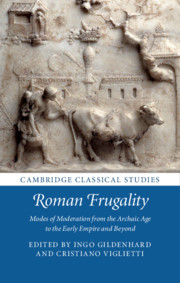Book contents
- Roman Frugality
- Cambridge Classical Studies
- Roman Frugality
- Copyright page
- Contents
- Figures
- Contributors
- Acknowledgements
- Note on Translations
- Abbreviations
- Introduction
- Chapter 1 ‘Frugality’, Economy and Society in Archaic Rome (Late Seventh to Early Fourth Century BCE)
- Chapter 2 From Licinius Stolo to Tiberius Gracchus: Roman Frugality and the Limitation of Landholding
- Chapter 3 Frugality as a Political Language in the Second Century BCE: The Strategies of Cato the Elder and Scipio Aemilianus
- Chapter 4 Smallholding, Frugality and Market Economy in the Gracchan age
- Chapter 5 Frugalitas, or: The Invention of a Roman Virtue
- Chapter 6 Frugality, Building, and Heirlooms in an Age of Social Mobility
- Chapter 7 From Poverty to Prosperity: The Recalibration of Frugality
- Index Locorum
- General Index
- References
Introduction
Frugality in Theory and History
Published online by Cambridge University Press: 26 June 2020
- Roman Frugality
- Cambridge Classical Studies
- Roman Frugality
- Copyright page
- Contents
- Figures
- Contributors
- Acknowledgements
- Note on Translations
- Abbreviations
- Introduction
- Chapter 1 ‘Frugality’, Economy and Society in Archaic Rome (Late Seventh to Early Fourth Century BCE)
- Chapter 2 From Licinius Stolo to Tiberius Gracchus: Roman Frugality and the Limitation of Landholding
- Chapter 3 Frugality as a Political Language in the Second Century BCE: The Strategies of Cato the Elder and Scipio Aemilianus
- Chapter 4 Smallholding, Frugality and Market Economy in the Gracchan age
- Chapter 5 Frugalitas, or: The Invention of a Roman Virtue
- Chapter 6 Frugality, Building, and Heirlooms in an Age of Social Mobility
- Chapter 7 From Poverty to Prosperity: The Recalibration of Frugality
- Index Locorum
- General Index
- References
Summary
The introduction begins with a discussion of previous scholarship on Roman frugality and a critique of its shortcoming. The second part consists of a theoretically informed reconsideration of frugality, which identifies four areas of special interest: (a) the lived realities and the husbandry of small-scale farmers and their discursive reflection in other settings; (b) ‘the frugal subaltern’: slaves and freedmen and their economic interests and acumen, as well as ‘the thrifty wife’; (c) Rome’s political culture, in particular its political economy, i.e. the interface of wealth and power; (d) the (literary/rhetorical) projects of specific individuals, not least those who invested in virtue signalling and shows of self-restraint in their self-promotion and/or authorial self-fashioning. The introduction concludes with a survey of the place and function of modes of moderation in Roman history and culture.
Keywords
Information
- Type
- Chapter
- Information
- Roman FrugalityModes of Moderation from the Archaic Age to the Early Empire and Beyond, pp. 1 - 126Publisher: Cambridge University PressPrint publication year: 2020
References
Accessibility standard: Unknown
Why this information is here
This section outlines the accessibility features of this content - including support for screen readers, full keyboard navigation and high-contrast display options. This may not be relevant for you.Accessibility Information
- 2
- Cited by
